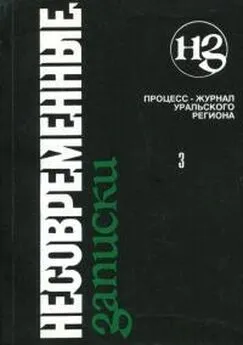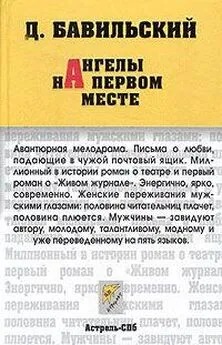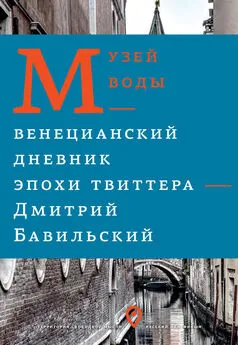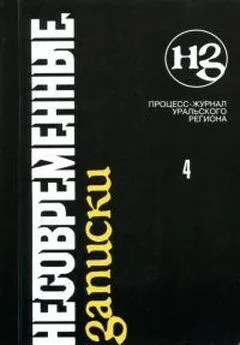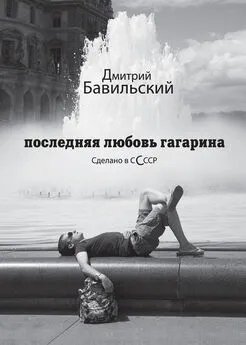Дмитрий Бавильский - Несовременные записки. Том 3
- Название:Несовременные записки. Том 3
- Автор:
- Жанр:
- Издательство:Фонд «Галерея», Фонд «Юрятин»
- Год:1996
- Город:[,б. м.]
- ISBN:5-87772-024-4
- Рейтинг:
- Избранное:Добавить в избранное
-
Отзывы:
-
Ваша оценка:
Дмитрий Бавильский - Несовременные записки. Том 3 краткое содержание
Несовременные записки. Том 3 - читать онлайн бесплатно полную версию (весь текст целиком)
Интервал:
Закладка:
'Oh, devil!' the man exclaimed, instantly having rolled in his mind the terrible picture of his little one falling into the river, and made a snatch at his shoulders. 'Do you want to fall down, you, silly guy?'
'Daddy, but I wouldn't fall down,' the boy said. 'I am holding on to you tight — see,' and he squeezed his father's hands with his for all he was worth.
There was another long silence. The dimmed disk of the setting sun loomed through light clouds and powerful crowns of old poplars which stood bending above the stream and softly rustled with their thick foliage. Everything around was tinged with fresh golden and crimson paints; only the old church standing too high above the bank seemed black against the background of bright evening mother-of-pearl — black, yet not a trifle gloomy.
'It's getting late, kiddy,' the man said. 'Let's go.'
'No,' the boy frowned. 'I don't want to go from here.'
'Neither do I, but I've got tired to sit here. Let's go.'
'Good,' the boy said reluctantly after a while.
In the same step-wise manner they descended the rock and stayed for some time by the river, on the very border of land and water. The boy picked up a stick and threw it in the rapids. Snatched up by the flow, it floated downstreams swiftly.
'Where is it floating to?' the boy asked.
'To the next river.'
'And from there?'
'To the further next one which is larger.'
'And from there?'
'To the still larger river.'
'And from there?'
'Into the ocean.'
'What ocean?'
'The Arctic.'
'Is it far from here?'
'Yes, it is very far.'
'How far?'
'About two thousand miles, I believe. Do you imagine such a distance?'
The boy pondered over the figure he had heard.
'No,' he said after a while. 'You see, Daddy, I don't know how many a thousand is.'
'Well,' his father explained. 'It'll take your stick about fortnight to reach Arctic ocean, see?'
'A fort… what?'
'A fortnight. Two weeks.'
'I want to Arctic ocean, Daddy.'
'It's too cold there. Ice, no people. Polar bears.'
'I know. Just like at Snow Queen's. But I will go there with you. Or we'll float down the river.'
'Let's go home, kittie,' the man said. 'It's getting late.'
'I won't cry,' the boy said. 'See, I have not cried when I been nettled.'
The man didn't answered. The Arctic, he thought. Kiddy, kiddy, you have just forgotten that tomorrow morning you will be in the other city, eighty miles from here, and then, in two or three days you and your mother will go to the sea. To the warm southern sea — very far from the Arctic.
'Come on, Leo,' he said.
They went in silence. After a while the boy wanted to be taken in arms, and when his father took him he saw tears in his big brown eyes. The man hugged him tight and quickened his pace.
The next morning — that of the parting — had passed for him in a kind of haze. His memory retained then only the very moment they said good-bye to each other, their eyes — his green and his kiddy's brown — filled with tears again. And the whole of the subsequent month was dragging in a fever of waiting, a nasty yet strangely wonderful state of mind when all events and episodes of one's life are inexorably erased out of conscience being none in comparison with a subject of the obsession. Over and over again was he rolling the pictures of their walks, talks, games and smiles in his memory. They were all very usual — and all very singular, for there was something in them which lay beyond their purely material content; something that inexplicably revealed the crazy adoration of the two for each other which they never tried to expose verbally. After all, they didn't need spending words to show it; for them it was just enough to talk, to walk, to play together and to feel this sheer impossibility of existing without each other — slight and elusive signs of their devotion, deep and mutual.
August came; trees began to drop their leaves hesitatingly, as if not believing yet in the forthcoming change of seasons; days, still warm, were followed now by cold, almost frosty nights which left green grass coloured in hoary silver after them. The month had passed; there came the time to ring up, the time to meet. He dialed the number and heard the voice of his former mother-in-law — dull with slow suave intonations. Hello, he said. Give me my Leo, please.
'But he is with Jesebel,' he heard. Jesebel was the name of his former wife. 'She decided not to return home from the sea. I think, she went directly on her stage practice and took the child with her.'
'Where to?'
'Somewhere to Switzerland, as far as I know.'
'What else do you happen to know as far as that?'
'Nothing, to my regret. She didn't inform us in detail.'
A lie. J. D. Salinger, he recollected. A perfect day for banana-fish. A perfect voice for lie. These slow nauseous intonations. You should learn from her how to tell lies, buddy, he said to himself. Listen — no voice tremor, no perplexity.
'You just don't want to say. You're programmed so, aren't you?'
'I really don't know.'
'And when will you know, then?'
'You will know it yourself soon. She will write you a letter.'
Another lie.
'When does she intend to return, after all?'
'Well… she said, in six months approximately.'
Said at random — just to take him off the wire? On the other hand, she told something about this half-year stage practice some two months before the divorce. And now she went on the practice with Leo surreptitiously — without warning him, without giving the address abroad. But why should you get surprised, buddy, he thought, it's purely her — or her family's — style, that of performing things in a manner of well-calculated and unparaded meanness.
'Good bye,' he said and hung up.
The fever of a short waiting turned into the pain of a long one. Autumn, that year cold and rainy, conquered the ancient town which stood dull and grey and sometimes almost invisible beyond the dense veil of drizzle; even the old church could not, as ever before, soften harshness of the weather. Day rolled after day, each extremely different from the earlier ones which had been marked with their meetings — actual or shortly expected. There was no letter, and it was natural, after all — she had found her be-shameless-yet-silent-if-you-want-to-win style which in no case implied clearing things up, and was elaborating it now. He rang up her parents several times. They're all right there, they were saying, and are to come back soon. Address, phone number? Don't know, we've got no feedback, unfortunately. It was a game, primitive and mean: we lie to you, you know it's a lie, and we know that you know it's a lie but good gracious, what is your knowledge based upon? The same be-shameless-yet-silent style; and he had nothing but to go on waiting for these long months to come to end.
The rainy autumn meanwhile inconspicuously transferred into the snowy winter. The hollow and the town in it got covered with the primeval whiteness of a tabula rasa on which pictures of the new season began to appear. Children were skiing and sledging down the snowy slopes of the gullies — dark figures against white background, Bruegel de Oude. An old Flemish landscape of the sixteenth century, too far from the Atlantic and from 1560s, though. And still old; and Flemish. He often came to the castle, cleared of snow the small rectangular between the pines and stood motionless for some minutes feeling the most happy and the most unhappy man in the world at the same time. Then he descended to the river and set off for the black stone, one half of which, that on the bank side, lay ice-bound, and the other was washed by lucid waters of the unfrozen rapids.
"'Daddy, where is my stick now?' recalled he once a dialogue of their last evening together. 'It's in Arctic ocean already?'
'No, kiddy. It'll be there in two weeks.'
'And it won't sink when it get to the ocean?'
'No, no. It will never go down. It's wooden, and wood never sinks in water.'"
"Why did John Bonham die?' remembered he another talk of theirs.
'He had drunk too much wine.'
'But Daddy, you drink much wine too.'
'Who told you so?'
'Mummy did '
'Take it easy, boy. I never drank as much as John Bonham.'
'I don't want you to die, Daddy.'
'I won't, kittie.'"
There came February, the last winter month, and the breath of spring, still elusive and fragile, began to be felt. Days became appreciably longer, the sun warmer. Thaw patches were coming in sight here and there; snow lay dirty and porous, as if prompting to the nature that it was time to get it away. The winter was drawing to end, and his long waiting together with it.
He rang just after having come from their castle and stone where he had stood imagining their forthcoming meeting, the talks which they would have and the plays they would invent. There was a tense pause on the line; then a succession of high-pitched beeps of a trunk-call; free line signals; a melodic tune; another beep, that time single; and a voice. A funeral drum of a voice — of the voice, for there were the same old dull and monotonous modulations. And a funeral drum of the news.
'They did not return yet,' he heard.
'Why?'
'Will… well, because Jesey got a contract and stayed.'
'Where?'
'Somewhere in Germany.'
'What do you mean by "somewhere"? No city, no address? Where exactly?' he remembered how Leo had said "ekzatly" when they were building their castle.
'I don't know.'
'Tell it to the mariners'.
'What do you want to say?'
'I say, tell your lies to the mariners.'
'How dare you!' a tone of indeservably insulted dignity. 'I really don't know'.
'And who knows, then?'
'Be so kind to stop your inquires, please. I am not going to answer your questions.'
He hung up.
It was a bad shock — suspected and sudden. To hope for the best and to be simultaneously prepared for the worst is a natural standard way but if your hopes go down the hole your preparedness for the worst appears to be of no help at all. The trouble, however foreseen, takes you aback, it covers you like an avalanche, deafening, and dumbing, and blinding you; and for some time you can't do anything about it. It is not a lack of courage or whatever else akin to courage. It's just that your mind is ready to resist the disaster but there is something else in you that is not. Soul? And who knows a cure for it?
The man is me, and the boy is my little one, Leo. And the town where he was my guest is my native one. Sometimes, when I look at the bunch of the houses on the river bank, I really see a flock of children — of abstract unknown children among whom I try to guess my boy. But who knows which house is disguising my son? And he motionlessly and voicelessly runs down to the water and doesn't see me standing on the opposite bank. I feel like in prison, I lost my freedom at the moment we said good-bye to each other and am now waiting for thee to come and release me, just like then in July, at the walls of our castle, when I was thy king and thou wert my true knight.
Where art thou, my little knight?
Where are you, my little one?
Can you hear me?
Can you ........
April 1993
Город стоит на высоких берегах быстрой извилистой реки, которая пробивает себе путь в мощных скалах, поросших сосняком и березняком. На одном из своих бесчисленных изгибов река образует обширную глубокую ложбину, и если вам доведется оказаться на ее восточном крае, вашему взору откроется великолепная панорама старого города, чьи маленькие островерхие домики в беспорядке разбросаны по склонам речных берегов. Приходилось ли вам когда-нибудь видеть приморские посёлочки, зажатые между горами и морем? Их домики, рассеянные там и сям на склонах гор, напоминают стайку ребятишек, что появились на вершине горы и затем внезапно бросились очертя голову вниз, к морю, и только бесконечная масса соленой воды остановила безудержный бег первых из них на самом берегу. Так же и дома старого города: они тоже напоминают стайку ребятишек, мчащихся к воде, — хотя водная преграда оказалась здесь далеко не такой непреодолимой, как бесконечные морские просторы, и некоторым из бегущих удалось перескочить через узкую ленточку реки; однако слишком много энергии было потрачено на неистовый бег вниз, и лишь немногие из беглецов нашли силы взобраться на противоположный склон, да и то не очень высоко. Сравнения такого рода — пусть и не безупречные — неизбежно приходят на ум наблюдателю, который стоит на краю ложбины, очарованный лежащей перед его глазами перспективой.
Читать дальшеИнтервал:
Закладка:
